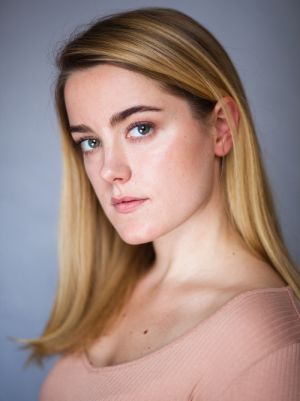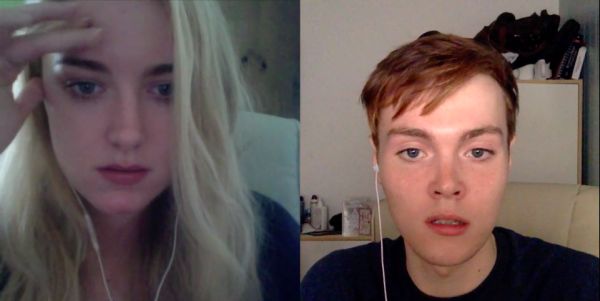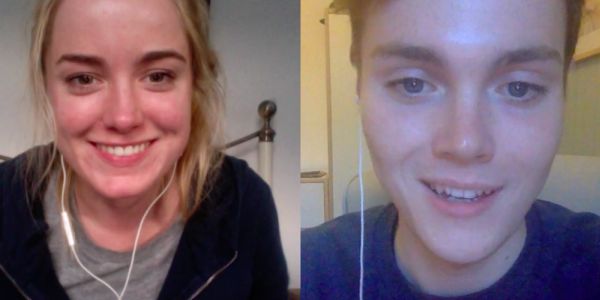Online Premiere: THESE THINGS NEVER LAST & Interview With Filmmaker Charlie Gillette
I love film, more than people probably, and I will…
Made while studying at the Royal Welsh College of Music and Drama (in Cardiff, Wales) Charlie Gillette and Jack Archer’s film, These Things Never Last, is inspired by the all to scary political zeitgeist. While we have moved leaps and bounds in terms of rights and justice for people of both sexes, all races, and the widening range of sexualities and gender identifiers, a great pool of bigotry remains. This bigotry is cloaked in ideas about job security for our nations, concern over rising crime, and raised taxes. And essentially a lot of the western world’s problems, which should be laid at the doorstep of bankers and narrow-minded politicians, are now being laid at the feet of immigrants, asylum seekers and refugees.
It is this misunderstanding of the world and a fear of the unknown that has led to the bigger problems we now face. A shockingly misguided decision to have a referendum on the UK’s position in the EU, along with a mismanaged campaign and the subsequent leave vote, has divided the country in two. In the US Donald Trump is using bigotry and lies to rally his position to be the leader of one of the world’s most powerful countries. The world isn’t what we thought it was. But while we may dislike this new world, where refugees from Northern Africa fight for their lives, and our friends are being abused because of their skin colour, us white westerners can still count on some freedoms. Or can we?
In These Things Never Last the American Charlie Gillette and British Jack Archer tackle the idea of how a white western couple would survive in a future without the freedoms we so easily take for granted. Using the simple narrative of a long distance relationship, but one in a scarily potential future, students Gillette and Archer threw caution to the wind for the final project of their MA in Acting for Stage, Screen & Radio. Ditching the usual idea of a play, they instead embarked upon a one hour film created entirely through FaceTime.
Julia Smith for Film Inquiry: Did the film originate from the current issues around Brexit and Trump? Or was it something you were toying with anyway, because of the current political climate?
Charlie Gillette: The original idea that came to our mind was to write a story about a couple that had been forced apart by some sort of apocalyptic disaster and how they try and stay together against all odds. The initial idea had much stronger sci-fi vibes. We were imagining all sorts of scenarios: nuclear warfare,

environmental disasters, even severe plagues! During our brainstorms, we realized that what’s going on in the world right now is actually pretty terrifying so rather than write about abstract scenarios so we decided to directly engage with the issues at hand in politics and our societies.
The political climate, at least in America, is something that’s been on my mind since I first became eligible to vote at age 18. In America, we have so many politicians who specifically try to attack women’s rights so this is always something I look to engage with in my work. It just happened that I was living in the UK at the time Brexit was happening and we were always talking about how crazy it was and how it would never happen. Jack and I began writing the script in early June and the whole time we were writing this thing imagining some sort of alternate nightmare world in which Brexit passed, but about halfway through the writing process, Brexit did pass and what we were writing became reality. It was very surreal, but we also found it intensely stimulating.
So we have a world where Brexit has actually passed, but we didn’t want to be too on the nose. We changed it around so that the equivalent of Brexit happens in America hence AmPro (the bill, in the film, that deports immigrants already living in America). This was inspired by Trump’s rising popularity during the Republican Primaries. We thought, what would happen if America turned into this isolationist nation? What would happen if we closed the borders and kicked everyone out like he’s proposing to do?
What gave you the idea to film just using FaceTime?
Jack and I were both in long distance relationships at the time, which is how we came up with the initial idea and so a lot of the issues James and Olivia go through in the film are based on our actual experiences. I spent a year only talking to my boyfriend (the editor of the film) once a week on Skype so the struggle definitely came from a real place.
We wanted to explore communication in relationships and how that is filtered through technology and how that breaks down over time. The film engages with many themes relating to how we interface with borders and boundaries in our world. For instance: immigration, technology, rules and relationships. We decided to take an experimental approach to the narrative. The relationship/story plays out entirely as a series of FaceTime conversations as a way of exploring how these issues are mediated through technology.
I saw the Laura Poitras show “Astro Noise” at the Whitney in New York and was inspired by this idea of government surveillance, the NSA etc. We thought it would be interesting to watch a couple through this type of surveillance, only seeing brief little windows into their exchanges, not getting the full picture. We acknowledge this theme in the final scene where an intimate moment between James and Olivia is captured through an innocuous webcam. We played with the idea of filming that scene in a traditional narrative way, but felt the theme of surveillance would be stronger if it was filmed in this way.
And did you have any technical problems to deal with?
There were so many and unpredicted technical difficulties involving production! We actually recorded each conversation live. There was no editing within scenes so everything had to be as close to perfect all the way through in one shot. There were obviously human errors like forgetting lines or tripping over words, but getting the technology to cooperate with us was another beast.

We would FaceTime each other and then record our screens using Quicktime so if the internet connection went wrong or the computer froze or glitched we’d lose everything and have to start over. Sometimes we would have a perfect take and then review the footage only to find half of it wasn’t recorded! Stuff like that. It was extremely frustrating at times, but that’s what you get when you’re experimenting.
How did you plan the production? Did you write a story or script ahead of time? Or did you and Jack improvise around agreed ideas?
Jack and I spent a lot of time developing the ideas before we got to writing. We would get together and just talk about our characters and build the world. We felt it was important for us to fully understand who these people are and the circumstances under which they operate before getting into the scenes. We laid out certain plot points that we wanted to reach during the film, but didn’t know how we would get there until we started improvising.
Once we felt confident in that, we sat down and improvised dialogue, which turned into the scenes. Sometimes one of us would write a scene on our own then we would workshop it together. If something that Jack wrote didn’t sound American enough, I would alter it to fit my dialect and vice versa. It was such a fun experiment. Because we wrote the script, it gave us a lot of freedom to play and mix things up during takes. If something was feeling stale or just wasn’t working, we could cut it or improvise new dialogue! To have that liberty as an actor was a really nice experience.
The editing process was interesting because Jack and I would film a cluster of scenes then file transfer them to our editor, Oliver David, in New York. I don’t know if you’ve ever had to send 10GB of footage via WeTransfer, but it takes ages! Oliver would work on the edit and give us some notes, but for the most part we were working without a director, which is pretty scary for most actors! We also had a very stressful crisis when we first imported the footage into Premiere and none of our audio synced to the footage properly. It looked like we would have to reshoot 90% of the film. Luckily Oliver knows what he’s doing technically and managed to figure out how to fix it without us having to do massive reshoots.
Do you guys film in the same location? My mind says you probably would have so you could discuss the production around your filming.
Because of the nature of how it was shot, we could have been on other sides of the world and it would have worked. We began shooting the film in two separate locations, but it became apparent that it would be much easier to film if we could troubleshoot and work together in person. We were working about 18 hours a day so Jack and I wound up living together for the month of shooting and editing.
The film includes some youtube and TV excerpts. How did you choose what to use? And did you have problems with clearances etc?
Finding clips we wanted to use took ages! There was a lot of trial and error in finding clips that worked. We wanted a way to break up the time between each conversation. Our initial idea was to show a flurry of texts, snapchats and other messages between Olivia and James, but decided that wouldn’t be adding anything to the story. The way we use found/appropriated footage is a means of commenting on the way media is often a distraction from the issues we should be facing.

We wanted to explore this idea that everyone is consumed by the media and pop-culture when there is really serious stuff going on! People are fighting and dying and killing yet we’re too obsessed with cat videos and Game of Thrones to pay attention. As the horrors of the world intensify as film goes on, we sort of see all of those things blending together, pop-culture layered over war footage and riots, in this giant mess of information.
I’ve never had to gain clearances for using other people’s work? Did you have any problems with getting these?
We’re using the clips as Appropriated Art, which means we’ve taken images from mass media, advertising and entertainment and have transformed and redefined the original works into a social commentary within our film.
So, what do you think would have happened to Olivia and James had they remained in the same city? Would things have run the same course?
It’s hard to say what would happen to them if they stayed in the same city. I think things may have remained status quo between them for longer. A lot of what we see in the film is how these two people change when they’re apart from each other. James sort of gets the rough end of the deal being deported and sent back to a failing economy, but Liv actually benefits from the distance. It gives her space to grow as an artist and become a more independent person and the changing political and economic situation gives her an opportunity to profit where she might not have before AmPro.
We didn’t want to address these political struggles in a black and white way. We thought the idea that something like Brexit could actually be beneficial for some people to a degree just as interesting as showcasing the obvious downsides and this is why we decided to have Olivia and James experience different ends of the spectrum. I think James would have benefitted from staying in the US, but I’m not sure if Olivia would have grown as much as she did with James around. It’s sad, but sometimes relationships ending are for the best, even though it doesn’t seem like it at the time.
The film brings the issue of immigration to white westerners. It’s a unique take, was it your intention to make the issues more relevant by featuring a white, western couple?
The immigration situation between Olivia and James is based on my relationship with my boyfriend. He is English and we live in New York together and he’s currently applying for is O-1 visa to remain in the US, but it’s a constant source of anxiety that our abilities to live and work in each other’s countries are so conditional and hinge on issues outside of our control.

It’s important to realise these issues don’t only affect people who come here illegally or people of color as the Trump campaign might want you to believe. I hope that by exploring this issue through the lens of a white, western couple, it might make the issue relatable for people who might not otherwise be sympathetic to something they don’t think will affect them.
I get the feeling that the environment is actually making James more bigoted toward the end of the film? Was it your intention that he maybe always felt this way or was it more that his anger and stress were making him resort to blame tactics?
I’m so glad you picked up on that because what we wanted people to understand that James ordinarily isn’t a bad guy and probably never would have said or felt these things had he not been in that situation! We wanted to explore how perfectly rational, level-headed people can change when under crippling stress, financial burden and helplessness. We’ve seen this in history, how good people can be swept up in terrible and dangerous ideologies when they are vulnerable, hurting and feel there is no other option.
It’s scary to think this is the environment we live in currently. The American people are so sick of the status quo in Washington, many of them are considering voting for a volatile racist misogynist man-child with zero experience not necessarily because they’re all bad people, but because they are desperate for a change.
What are your hopes, politically? How bad do you think it might get? And as an American do you think Trump is a real threat?
I think politically, we’re living in a really scary time. We’re seeing the rise of nationalism, fascism and hatred all over the globe. I think Trump is extremely dangerous and if he were to win, he is fully capable of driving this country into the ground. Not only is he extremely unqualified to be president, he is openly racist and misogynistic, frequently incites political violence, has an uncontrollable temper and brags about sexually assaulting women. His behavior during this campaign has unfortunately already legitimized this type of behavior for a lot of Americans. The whole situation is disgraceful.

Politically, my hopes are that everyone who is eligible to vote does so and that Trump loses in a landslide. I saw this happen in the UK where everyone was so adamant that Brexit wouldn’t pass, yet come to find out the reason it passed was because these people didn’t vote! This terrifies me because it could easily happen in America. We need to educate ourselves about the issues that matter and hold our elected officials accountable. We cannot stay complacent with the system: speak out about things you feel strongly about, write to your officials, make art, protest, participate.
Our generation has been criticized for being politically apathetic, which is definitely true to an extent. I think apathy can be just as dangerous as an emotionally unstable fascist running for president. That’s why I included that scene towards the end of the film where Olivia speaks about the consequences of her inaction. We have the power to stop Brexits and Trumps from happening, but we need to vote.
Many thanks to Charlie for taking the time to answer my questions, and an even bigger thanks to her and Jack for choosing to release the film to the public and allowing us to premiere it here at Film Inquiry.
For more information on the makers or to talk to them online: Charlie can be found on twitter @Charkattacks or on her website, Jack can be found @JackArcher93 and Oliver @makesandbreaks or on his website.
Does content like this matter to you?
Become a Member and support film journalism. Unlock access to all of Film Inquiry`s great articles. Join a community of like-minded readers who are passionate about cinema - get access to our private members Network, give back to independent filmmakers, and more.
I love film, more than people probably, and I will watch pretty much anything. Seriously, anything! I have a postgraduate education in film & have spent an exceptionally long time trying to get inside the film industry. I'm a big believer in treating every film the same, and bringing something new to the film theory table, giving reasons for every argument made. You'll find that I'm an empathetic and fun sort of reviewer, at least, I like to think so. If I'm not watching films I'm doing exceptionally nerdy stuff, like watching documentaries about the history of medicine and collecting photos of old post boxes.













